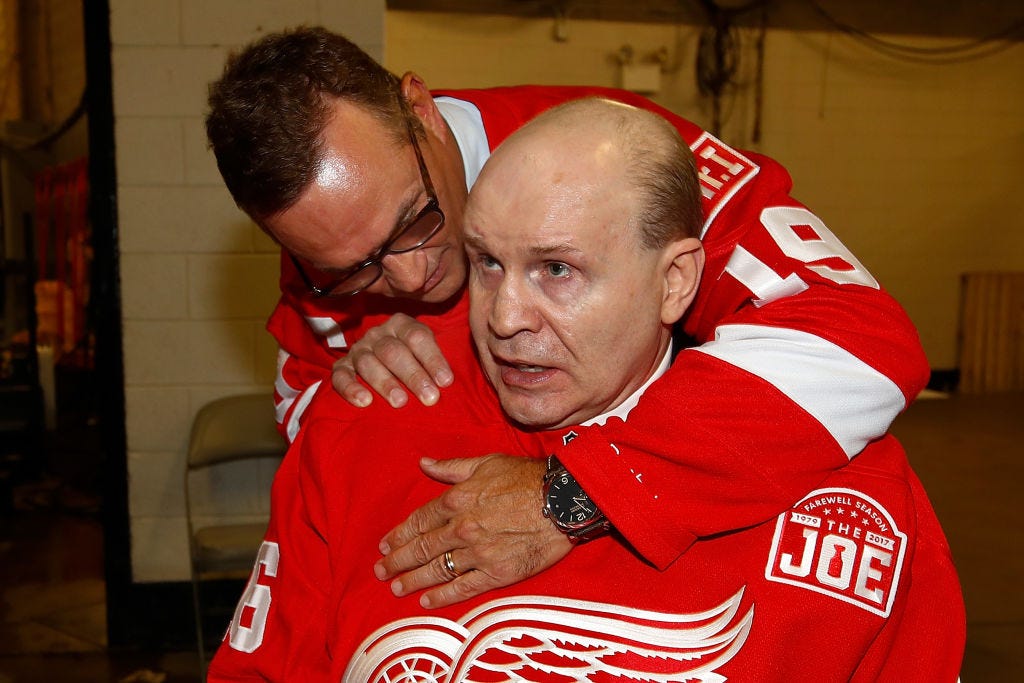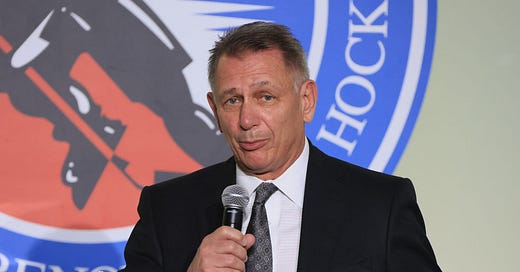Ken Holland was a cornerstone of Red Wings' dynasty
And because he channelled his inner Ken Holland from his Detroit days, the Hall of Fame builder might be on his way to building another in Edmonton
There was a time in the mid-1990s when the American Hockey League was pondering what to do about the scourge of tie games. Ken Holland was at the league’s annual meetings in his capacity as assistant GM of the Detroit Red Wings when someone floated the idea of making ties worth zero points in the standings. It was pretty clear how Holland felt about the scheme. “Let me get this straight,” he said. “We’re going to tell people, ‘What you just saw here, nothing happened. Nothing happened. Fuck off. Go home. And, by the way, we play again next Tuesday.’ ”
It is the quintessential Ken Holland yarn in a career filled with them. And it illustrates the qualities that earned him induction into the Hockey Hall of Fame’s Class of 2020 – pragmatism, decisiveness, a keen sense of humor and, above all, a passion for the game and a sense of obligation to do what is best for it. They have been Holland’s guiding principles throughout his career, one that has seen him be the only GM in the history of the game to win Stanley Cups before and after the advent of the salary cap. (And depending on whether Lou Lamoriello ever wins one with the New York Islanders, Holland might be the only one to ever accomplish the feat.)
Holland was prepared for life as a door-to-door vacuum cleaner salesman in Kelowna when his former coach, Bill Dineen, called offering him a job as a scout with the Detroit Red Wings. That sent Holland on a trajectory that would see him win four Stanley Cups with the Red Wings – three as the GM and one as assistant GM – and assemble some of the most talented rosters the game has ever seen. And even though the Red Wings had an unlimited budget and were a desired destination for star players, their success was built through the draft. Holland was a huge part of that, both as a scout and GM. In fact, he was part of the scouting staff that had one of the most bountiful hauls in NHL history. In 1989, with Holland as director of amateur scouting, the Red Wings selected Mike Sillinger 11th overall, Bob Boughner 32nd, Nicklas Lidstrom 53rd, Sergei Fedorov 74th, Dallas Drake 116th and Vladimir Konstantinov 221st.
(The Red Wings intended on taking Pavel Bure in the fifth round that year, but were told by NHL vice-president Gil Stein that Bure was an ineligible player because he had played only seven games in the Soviet League and the minimum was nine. Red Wings’ European scout Christer Rockstrom told the draft table that he could prove Bure had played the requisite number of games. The Wings were going to take him with their sixth-round pick, but were beaten to the punch by the Vancouver Canucks, who had taken him three picks earlier. Imagine if the Wings had taken Bure as well in that draft? Oy vey.)

“Konstantinov was going to be a Hall of Famer,” Holland said. “Konstantinov, Lidstrom, Fedorov. That draft, added to Steve Yzerman…then in the next two or three drafts after, we brought in guys like Martin Lapointe and Darren McCarty and Chris Osgood. That was really the making of who the Detroit Red Wings were from 1995 to 2010.”
There are not many franchises in the history of any sport that have had a run through two decades that the Red Wings enjoyed. And one of the constants throughout was the presence of Holland, who was never afraid to make bold moves. In an effort to win a third-straight Stanley Cup in 1998-99, Holland acquired a 37-year-old Chris Chelios, a 32-year-old Wendel Clark and Bill Ranford and a 35-year-old Ulf Samuelsson on deadline day. They lost in the second round that year, but the Chelios acquisition might have been Holland’s best work as a GM in Detroit. “I thought Chelios could help us through a couple of years and he stayed a decade, until he was 47,” Holland said. “He impacted our team. Some people thought he might be done and then he went out and finished second in Norris Trophy voting when he was 40.”
And like any great GM, some of the greatest moves were ones that Holland never made. The Red Wings bookended the 2004-05 lockout by winning the Presidents’ Trophy and being bounced early in the playoffs – in the second round by Calgary in 2004 and in the first round by Edmonton in ’06. All Holland kept hearing from the Red Wings fan base and the hockey world was that he had a great regular-season team, but not one that was built for the playoffs, which was code at the time for saying there weren’t enough gritty Canadians on the roster. He ignored much of the white noise, and the Red Wings won another Cup in 2008 before losing in the Stanley Cup final in ’09.
“I remember the criticism,” Holland said. “We were too Europeany because we were counting on (Henrik) Zetterberg and (Pavel) Datsyuk. Steve Yzerman had retired and I talked to Steve in the locker room and he said, ‘Ken, they’re great, great players.’ I’m patient. Some fans might think I’m too patient. I’m loyal. Some people might think I’ve been too loyal, but I think it has served me well.”
It has indeed. And one of the things about Holland that has made him so successful is he doesn’t think he’s the smartest person in the room. Listening to Yzerman was not the last time he heeded a player’s advice. After the Oilers were shocked and swept in the first round by the Winnipeg Jets last season, the common theme in the exit meetings was that the Oilers needed more experience in their lineup, preferably in the form of players who have won before. That’s why, against all the advice of the analytics community, he went out and signed Duncan Keith. He also picked up Zach Hyman on a long-term deal that might not age well, but will help the Oilers in the next couple of seasons. He also signed Cody Ceci, another red flag when it came to analytics. Perhaps the best acquisition of them all was Warren Foegele, who has given the Oilers valuable offensive depth.
In short, over the summer, Holland basically went back to being the GM he was when he was successful with the Red Wings. It could give him another Stanley Cup or two before his contract in Edmonton runs out in 2024. “My experience is when it comes to winning the Cup, you keep banging on the door,” Holland said. “It’s trial and error. It doesn’t work and you come back and make a few tweaks. Everybody focuses on the Stanley Cup because that’s the ultimate, but you’ve got to have so many other wins along the way…so many other things along the way to build to that.”




